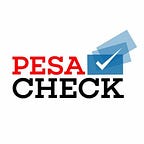FALSE: Face masks did not cause the second wave of COVID-19 in South Africa
The second wave of the disease in South Africa has been attributed to a new variant of the coronavirus that has since spread to other countries.
A video, posted on Facebook, claiming that wearing of protective facemasks caused the second wave of COVID-19 in South Africa is FALSE.
The post, captioned “The cause of the second wave”, bases the claim on a video in which a man uses what he says is a carbon dioxide detector to conduct a test to measure the air inside the face mask he is wearing.
In the video, the subject places the air intake for the meter inside the face mask he is wearing. The reading on the meter rises consistently until it reaches almost 10,000 parts per million (ppm). He then displays a chart printed on a piece of paper and goes on to explain that levels of carbon dioxide above 5,000 ppm could lead to severe effects, including death.
The presenter discourages people from wearing masks, saying users would be better off without them.
But are there dangers associated with wearing face masks and are they responsible for the second wave of COVID-19 in South Africa as the post claims?
Research shows that masks are safe to wear and remain one of several recommended preventative measures against the virus. The latest COVID-19 surge in South Africa was caused by a new variant of the coronavirus and not by wearing masks as the post claims.
A research study on the wearing of N95 masks concluded that the amounts of oxygen and carbon dioxide entering the body are no different whether one is wearing a mask or not.
A joint study by scientists from Cambridge and Greenwich universities, suggests that even homemade masks can dramatically reduce transmission rates if enough people wear them in public.
The study reports that population-wide face mask use could push COVID-19 transmission down to controllable levels for national epidemics, and prevent new waves of the pandemic disease when combined with lockdowns.
Reports say the second wave of COVID-19 in South Africa was spurred by a newly identified variant of the coronavirus.
According to the World Health Organization (WHO), 501Y.V2 variant, first identified in South Africa, has been confirmed to be more contagious than earlier variants and has accounted for higher hospital admissions. It has since been found in Botswana, Ghana, Kenya, Comoros, Zambia and in 24 non-African nations.
The second wave forced South African authorities to impose new restrictions in December 2020 in a bid to curb its spread.
On February 1, 2021, South Africa’s President Cyril Ramaphosa said the country had “passed the peak” of its second COVID-19 infection wave, allowing for the easing of restrictions put in place two months earlier.
PesaCheck has looked into a video shared on a Facebook post claiming that protective face masks caused the second wave of COVID-19 in South Africa and finds that it is FALSE.
This post is part of an ongoing series of PesaCheck fact-checks examining content marked as potential misinformation on Facebook and other social media platforms.
By partnering with Facebook and similar social media platforms, third-party fact-checking organisations like PesaCheck are helping to sort fact from fiction. We do this by giving the public deeper insight and context to posts they see in their social media feeds.
Have you spotted what you think is fake news or false information on Facebook? Here’s how you can report. And, here’s more information on PesaCheck’s methodology for fact-checking questionable content.
This fact-check was written by PesaCheck fact-checker James Okong’o and edited by chief copy editor Rose Lukalo. It was approved for publication by managing editor Enock Nyariki.
PesaCheck is East Africa’s first public finance fact-checking initiative. It was co-founded by Catherine Gicheru and Justin Arenstein, and is being incubated by the continent’s largest civic technology and data journalism accelerator: Code for Africa. It seeks to help the public separate fact from fiction in public pronouncements about the numbers that shape our world, with a special emphasis on pronouncements about public finances that shape government’s delivery of Sustainable Development Goals (SDG) public services, such as healthcare, rural development and access to water/sanitation. PesaCheck also tests the accuracy of media reportage. To find out more about the project, visit pesacheck.org.
PesaCheck is an initiative of Code for Africa, through its innovateAFRICA fund, with support from Deutsche Welle Akademie, in partnership with a coalition of local African media and other civic watchdog organisations.
